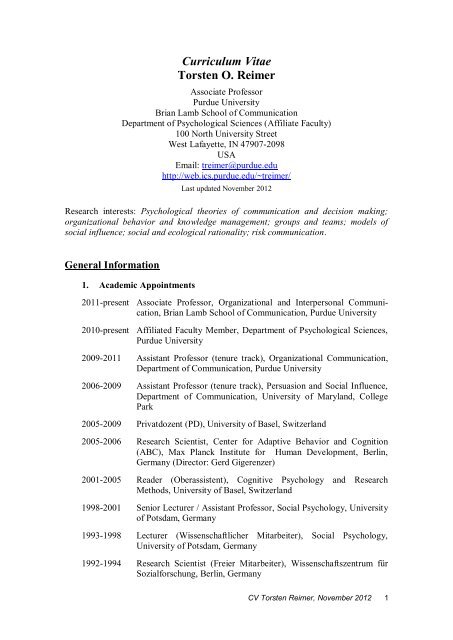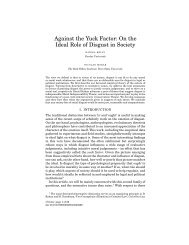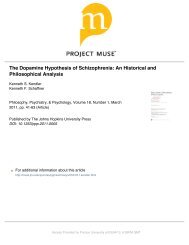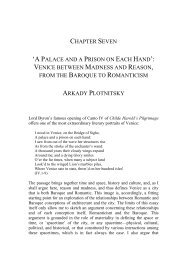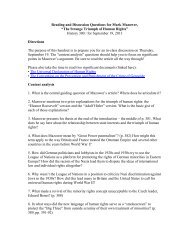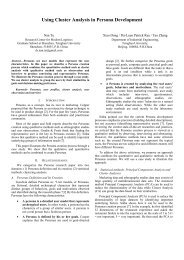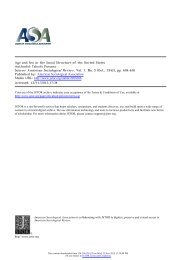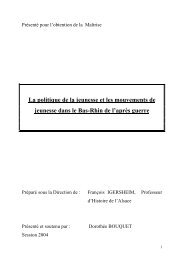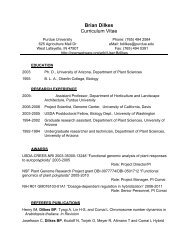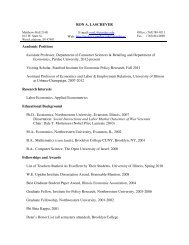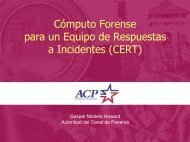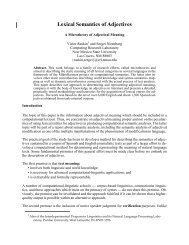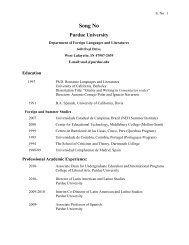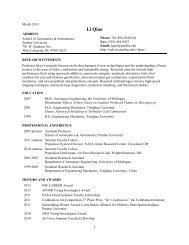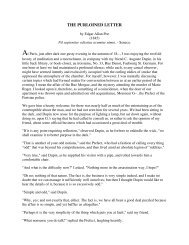Curriculum Vitae Torsten O. Reimer - Purdue University
Curriculum Vitae Torsten O. Reimer - Purdue University
Curriculum Vitae Torsten O. Reimer - Purdue University
You also want an ePaper? Increase the reach of your titles
YUMPU automatically turns print PDFs into web optimized ePapers that Google loves.
<strong>Curriculum</strong> <strong>Vitae</strong><br />
<strong>Torsten</strong> O. <strong>Reimer</strong><br />
Associate Professor<br />
<strong>Purdue</strong> <strong>University</strong><br />
Brian Lamb School of Communication<br />
Department of Psychological Sciences (Affiliate Faculty)<br />
100 North <strong>University</strong> Street<br />
West Lafayette, IN 47907-2098<br />
USA<br />
Email: treimer@purdue.edu<br />
http://web.ics.purdue.edu/~treimer/<br />
Last updated November 2012<br />
Research interests: Psychological theories of communication and decision making;<br />
organizational behavior and knowledge management; groups and teams; models of<br />
social influence; social and ecological rationality; risk communication.<br />
General Information<br />
1. Academic Appointments<br />
2011-present Associate Professor, Organizational and Interpersonal Communication,<br />
Brian Lamb School of Communication, <strong>Purdue</strong> <strong>University</strong><br />
2010-present Affiliated Faculty Member, Department of Psychological Sciences,<br />
<strong>Purdue</strong> <strong>University</strong><br />
2009-2011 Assistant Professor (tenure track), Organizational Communication,<br />
Department of Communication, <strong>Purdue</strong> <strong>University</strong><br />
2006-2009 Assistant Professor (tenure track), Persuasion and Social Influence,<br />
Department of Communication, <strong>University</strong> of Maryland, College<br />
Park<br />
2005-2009 Privatdozent (PD), <strong>University</strong> of Basel, Switzerland<br />
2005-2006 Research Scientist, Center for Adaptive Behavior and Cognition<br />
(ABC), Max Planck Institute for Human Development, Berlin,<br />
Germany (Director: Gerd Gigerenzer)<br />
2001-2005 Reader (Oberassistent), Cognitive Psychology and Research<br />
Methods, <strong>University</strong> of Basel, Switzerland<br />
1998-2001 Senior Lecturer / Assistant Professor, Social Psychology, <strong>University</strong><br />
of Potsdam, Germany<br />
1993-1998 Lecturer (Wissenschaftlicher Mitarbeiter), Social Psychology,<br />
<strong>University</strong> of Potsdam, Germany<br />
1992-1994 Research Scientist (Freier Mitarbeiter), Wissenschaftszentrum für<br />
Sozialforschung, Berlin, Germany<br />
CV <strong>Torsten</strong> <strong>Reimer</strong>, November 2012 1
1989-1993 Research Assistant (Studentische Hilfskraft), Social Psychology,<br />
Free <strong>University</strong> of Berlin, Germany<br />
2. Education<br />
Habilitation 2005 <strong>University</strong> of Basel, Switzerland,<br />
Psychology (venia docendi for psychology)<br />
Ph.D. 1996 Free <strong>University</strong> of Berlin, Germany,<br />
Psychology (Dr. phil., summa cum laude)<br />
M.A. 1993 Free <strong>University</strong> of Berlin, Germany,<br />
Psychology (Diplom)<br />
B.A. 1989 Free <strong>University</strong> of Berlin, Germany,<br />
Psychology (Vordiplom)<br />
B.A. 1987 <strong>University</strong> of Tuebingen, Germany,<br />
Philosophy and Linguistics (Vordiplom)<br />
3. Awards and Honors<br />
2012 Dennis Gouran Research Award, Group Communication Division,<br />
National Communication Association<br />
2012 Top Paper Award, Communication and Social Cognition Division,<br />
National Communication Association<br />
2008 Golden Anniversary Monograph Award, National Communication<br />
Association<br />
2008 Outstanding Reviewer Award, Organizational Behavior Division,<br />
Academy of Management<br />
2008 Elected to full membership, Maryland Chapter of Sigma Xi: The<br />
Scientific Research Society<br />
2006 Travel award U Maryland ($ 400)<br />
2005 The School of Psychology’s Award for Excellence in Research, U<br />
Basel, Switzerland ($ 2,000)<br />
2004 Travel award U Basel ($ 2,000)<br />
2004 Grant from U Basel ($ 15,000)<br />
2004-2005 Visiting research scholar, Psychology, NDSU (with Verlin Hinsz)<br />
2002-2003 Research fellowship, Center for Adaptive Behavior and Cognition<br />
(ABC), Max Planck Institute for Human Development, Berlin,<br />
Germany (with Gerd Gigerenzer)<br />
2001 ―Lecturer of the year 2001‖ awarded by the student representatives of<br />
the Department of Psychology, U Basel, Switzerland<br />
CV <strong>Torsten</strong> <strong>Reimer</strong>, November 2012 2
1998 Visiting research fellow, School of Social Sciences, <strong>University</strong> of<br />
Sussex, Great Britain (with Peter Harris)<br />
1983 Scheffel award<br />
4. Memberships in Professional Organizations<br />
National Communication Association<br />
International Communication Association<br />
Academy of Management<br />
American Psychological Association (international affiliate)<br />
European Association of Social Psychology<br />
Cognitive Science Society<br />
Research and Scholarship<br />
1. Articles in Refereed Journals<br />
Blair, J. P., Levine, T. R., <strong>Reimer</strong>, T., & McCluskey, J. D. (2012). The gap between<br />
reality and research: Another look at detecting deception in field settings. Policing:<br />
An International Journal of Police Strategies and Management, 35, 723-740.<br />
Luan, S., Katsikopoulos, K., & <strong>Reimer</strong>, T. (2012). When does diversity trump<br />
ability (and vice versa) in group decision making? A simulation study. PLoS ONE,<br />
7(2), 1-9, e31043.<br />
<strong>Reimer</strong>, T., <strong>Reimer</strong>, A., & Hinsz, V. (2010). Naïve groups can solve the hiddenprofile<br />
problem. Human Communication Research, 36, 443-467.<br />
<strong>Reimer</strong>, T., <strong>Reimer</strong>, A., & Czienskowski, U. (2010). Decision-making groups<br />
attenuate the discussion bias in favor of shared information: A meta-analysis.<br />
Communication Monographs, 77, 121-142.<br />
Skubisz, C., <strong>Reimer</strong>, T., & Hoffrage, U. (2009). Communicating quantitative risk<br />
information. In C. Beck (Ed.), Communication Yearbook 33 (pp. 176-211). New<br />
York: Routledge.<br />
Hertwig, R., Herzog, S., Schooler, L., & <strong>Reimer</strong>, T. (2008). Fluency heuristic: A<br />
model of how the mind exploits a by-product of information retrieval. Journal of<br />
Experimental Psychology: Learning, Memory, and Cognition, 34, 1191-1206.<br />
Schwenk, G., & <strong>Reimer</strong>, T. (2008). Simple heuristics in complex networks: Models<br />
of social influence. Journal of Artificial Societies and Social Simulation (JASSS),<br />
11 (3) 4, .<br />
<strong>Reimer</strong>, T., Kuendig, S., Hoffrage, U., Park, E., & Hinsz, V. (2007). Effects of the<br />
information environment on group discussions and decisions in the hidden-profile<br />
paradigm. Communication Monographs, 74, 1-28.<br />
<strong>Reimer</strong>, T., Hoffrage, U., & Katsikopoulos, K. (2007). Entscheidungsheuristiken in<br />
Gruppen [Heuristics in group decision-making]. NeuroPsychoEconomics, 2, 7-29.<br />
CV <strong>Torsten</strong> <strong>Reimer</strong>, November 2012 3
Brand, S., <strong>Reimer</strong>, T., & Opwis, K. (2007). How do we learn in a negative mood?<br />
Effects of a negative mood on transfer and learning. Learning and Instruction, 17,<br />
1-16.<br />
<strong>Reimer</strong>, T., Park, E., & Hinsz, V. (2006). Shared and coordinated cognition in<br />
competitive and dynamic task environments: An information-processing<br />
perspective for team sports. International Journal of Sport and Exercise<br />
Psychology, 4, 376-400.<br />
<strong>Reimer</strong>, T., & Hoffrage, U. (2006). The ecological rationality of simple group<br />
heuristics: Effects of group member strategies on decision accuracy. Theory and<br />
Decision, 60, 403-438.<br />
Adamowicz, W. A., Hanemann, M., Swait, J., Johnson, R., Layton, D.,<br />
Regenwetter, M., <strong>Reimer</strong>, T., & Sorkin, R. (2005). Decision Strategy and Structure<br />
in Households: A "groups" perspective. Marketing Letters, 16 (3-4), 387-399.<br />
<strong>Reimer</strong>, T., & Hoffrage, U. (2005). Can simple group heuristics detect hidden<br />
profiles in randomly generated environments? Swiss Journal of Psychology, 64 (1),<br />
21-37.<br />
<strong>Reimer</strong>, T., & Katsikopoulos, K. (2004). The use of recognition in group decisionmaking.<br />
Cognitive Science, 28 (6), 1009-1029.<br />
Hoffrage, U., & <strong>Reimer</strong>, T. (2004). Models of bounded rationality: The approach of<br />
fast and frugal heuristics. Management Revue, 15 (4), 437-459.<br />
<strong>Reimer</strong>, T., Mata, R., & Stoecklin, M. (2004). The use of heuristics in persuasion:<br />
Deriving cues on source expertise from argument quality. Current Research in<br />
Social Psychology, 10 (6), 69-83.<br />
Brand, S., <strong>Reimer</strong>, T., & Opwis, K. (2003). Effects of metacognitive thinking and<br />
knowledge acquisition in dyads on individual problem solving and transfer<br />
performance. Swiss Journal of Psychology, 62 (4), 251-261.<br />
<strong>Reimer</strong>, T. (2003). Direkte und indirekte Effekte der Argumentqualität: Der<br />
Einfluss der Argumentstärke auf die wahrgenommene Expertise eines<br />
Kommunikators. [Direct and indirect effects of argument quality: The impact of<br />
argument strength on the perceived expertise of a communicator.] Zeitschrift für<br />
Sozialpsychologie, 34 (4), 243-255.<br />
<strong>Reimer</strong>, T. (2001). Attributions for poor group performance as a predictor of<br />
perspective-taking and subsequent group achievement: A process model. Group<br />
Processes and Intergroup Relations, 4 (1), 31-47.<br />
<strong>Reimer</strong>, T., & Auhagen, A. (2001). Identifying Boolean networks in multivariate<br />
time series: The prediction of contact behavior in friendship dyads. Psychologische<br />
Beiträge, 43, 101-121.<br />
<strong>Reimer</strong>, T. (2001). Kognitive Ansätze zur Vorhersage der Problemlöseleistung in<br />
Gruppen: Distraktion, Kompensation und Akzentuierung. [Cognitive approaches to<br />
predicting group performance: Distraction, compensation, and accentuation.]<br />
Zeitschrift für Sozialpsychologie, 2, 107-128.<br />
Dutke, S., & <strong>Reimer</strong>, T. (2000). Evaluation of two types of online help for<br />
application software. Journal of Computer Assisted Learning, 16, 307-315.<br />
CV <strong>Torsten</strong> <strong>Reimer</strong>, November 2012 4
Krahé, B., <strong>Reimer</strong>, T., Scheinberger-Olwig, R., & Fritsche, I. (1999). Measuring<br />
sexual aggression: The reliability of the Sexual Experiences Survey in a German<br />
sample. Journal of Interpersonal Violence, 14 (1), 91-100.<br />
<strong>Reimer</strong>, T. (1997). Präsupponieren und Argumentieren: Präsuppositionen als<br />
zentrale Hinweisreize bei einer elaborierten Verarbeitung von Argumenten.<br />
[Presupposing and arguing: Presuppositions as central cues under high argument<br />
elaboration.] Sprache und Kognition, 2, 61-77.<br />
<strong>Reimer</strong>, T., Neuser, A., & Schmitt, C. (1997). Unter welchen Bedingungen erhöht<br />
die Kommunikation zwischen den Gruppenmitgliedern die Koordinationsleistung<br />
in einer Kleingruppe? [Under what conditions does communication among group<br />
members enhance performance in small groups?] Zeitschrift für experimentelle<br />
Psychologie, 3, 495-518.<br />
2. Books<br />
Cho, H., <strong>Reimer</strong>, T., & McComas, K. A. (Eds.) (in preparation). The SAGE<br />
Handbook of Risk Communication. Thousand Oaks, CA: Sage.<br />
<strong>Reimer</strong>, T. (1999). Argumentieren und Problemlösen. [Arguing and problem<br />
solving.] Lengerich, Germany: Pabst Science Publishers.<br />
3. Chapters in Books<br />
<strong>Reimer</strong>, T., Hertwig, R., & Sipek, S. (2012). Probabilistic persuasion: A<br />
Brunswikian theory of argumentation. In R. Hertwig, U. Hoffrage, & the ABC<br />
Research Group (Eds.), Simple heuristics in a social world (p. 33-55). New York:<br />
Oxford <strong>University</strong> Press.<br />
<strong>Reimer</strong>, T., & Hoffrage, U. (2012). Simple heuristics and information sharing in<br />
groups. In R. Hertwig, U. Hoffrage, & the ABC Research Group (Eds.), Simple<br />
heuristics in a social world (p. 266-286). New York: Oxford <strong>University</strong> Press.<br />
Luan, S., Katsikopoulos, K., & <strong>Reimer</strong>, T. (2012). The "less-is-more" effect in<br />
group decision making. In R. Hertwig, U. Hoffrage, & the ABC Research Group<br />
(Eds.), Simple heuristics in a social world (p. 245-265). New York: Oxford<br />
<strong>University</strong> Press.<br />
<strong>Reimer</strong>, T., & Hoffrage, U. (2012). Ecological rationality for teams and<br />
committees: Heuristics in group decision making. In P. M. Todd, G. Gigerenzer, &<br />
the ABC Research Group (Eds.), Ecological rationality: Intelligence in the world<br />
(pp. 335-359). New York: Oxford <strong>University</strong> Press.<br />
Katsikopoulos, K., & <strong>Reimer</strong>, T. (2012). Recognition-based consensus: How<br />
groups use partial ignorance to make good group decisions. In P. M. Todd, G.<br />
Gigerenzer, & the ABC Research Group (Eds.), Ecological rationality: Intelligence<br />
in the world (pp. 167-183). New York: Oxford <strong>University</strong> Press.<br />
<strong>Reimer</strong>, T., & Katsikopoulos, K. (2011). The use of recognition in group decision<br />
making. In G. Gigerenzer, R. Hertwig, & T. Pachur (Eds.), Fast and frugal<br />
CV <strong>Torsten</strong> <strong>Reimer</strong>, November 2012 5
heuristics: Theory, tests, and applications (pp. 561-576). New York: Oxford<br />
<strong>University</strong> Press. [Reprint of journal article].<br />
Hertwig, R., Herzog, S., Schooler, L., & <strong>Reimer</strong>, T. (2011). Fluency heuristic: A<br />
model of how the mind exploits a by-product of information retrieval. In G.<br />
Gigerenzer, R. Hertwig, & T. Pachur (Eds.), Fast and frugal heuristics: Theory,<br />
tests, and applications (pp. 540-560). New York: Oxford <strong>University</strong> Press. [Reprint<br />
of journal article].<br />
<strong>Reimer</strong>, T., & Rieskamp, J. (2007). Fast and frugal heuristics. In R. F. Baumeister<br />
& K. D. Vohs (Eds.), Encyclopedia of Social Psychology (pp. 346-348). Thousand<br />
Oaks, CA: Sage.<br />
Rieskamp, J., & <strong>Reimer</strong>, T. (2007). Ecological rationality. In R. F. Baumeister &<br />
K. D. Vohs (Eds.), Encyclopedia of Social Psychology (pp. 273-275). Thousand<br />
Oaks, CA: Sage.<br />
Raab, M., & <strong>Reimer</strong>, T. (2007). Intuitive und deliberative Entscheidungen im Sport<br />
[Intuitive and deliberative decisions in sports]. In N. Hagemann, M. Tietjens, & B.<br />
Strauß (Eds.), Psychologie der sportlichen Höchstleistung [The psychology of peak<br />
performance in sport] (pp. 93-117). Göttingen: Hogrefe.<br />
Schwenk, G., & <strong>Reimer</strong>, T. (2007). Social influence and bounded rationality:<br />
Heuristic decision making in complex networks. In D. S. McNamara, & G. Trafton<br />
(Eds.), Proceedings of the Twenty-Ninth Annual Conference of the Cognitive<br />
Science Society (pp. 1479-1484). Mahwah, NJ: Lawrence Erlbaum Associates.<br />
<strong>Reimer</strong>, T., Mata, R., Katsikopoulos, K., & Opwis, K. (2005). On the interplay<br />
between heuristic and systematic processes in persuasion. In B.G. Bara, L.<br />
Barsalou, & M. Bucciarelli (Eds.), Proceedings of the Twenty-Seventh Annual<br />
Conference of the Cognitive Science Society (pp. 1833-1838). Mahwah, NJ:<br />
Lawrence Erlbaum Associates.<br />
Brunner, T., <strong>Reimer</strong>, T., & Opwis, K. (2005). Cancellation and focus: The impact<br />
of feature attractiveness on recall. In K. Opwis & I.-K. Penner (Eds.), Proceedings<br />
of KogWis05. The German Cognitive Science Conference 2005 (pp. 27-32). Basel:<br />
Schwabe.<br />
Brand, S., <strong>Reimer</strong>, T., & Opwis, K. (2005). Effects of negative mood on transfer<br />
and learning. In K. Opwis & I.-K. Penner (Eds.), Proceedings of KogWis05. The<br />
German Cognitive Science Conference 2005 (pp. 21-26). Basel: Schwabe.<br />
<strong>Reimer</strong>, T., Bornstein, A.-L., & Opwis, K. (2005). Positive and negative transfer<br />
effects in groups. In T. Betsch & S. Haberstroh (Eds.), The routine of decision<br />
making (pp. 175-192). Mahwah, NJ: Lawrence Erlbaum Associates.<br />
<strong>Reimer</strong>, T. (2004). Entscheidungs- und Problemlöseheuristiken in Gruppen<br />
[Decision and problem-solving heuristics in groups]. Kumulative Habilitationsschrift<br />
[Cumulative habilitation thesis]. Universität Basel, Switzerland.<br />
<strong>Reimer</strong>, T., & Hoffrage, U. (2003). Information aggregation in groups: The<br />
approach of simple group heuristics (SIGH). In R. Alterman & D. Kirsch (Eds.),<br />
Proceedings of the Twenty-Fifth Annual Conference of the Cognitive Science<br />
Society (pp. 982-987). Mahwah, NJ: Lawrence Erlbaum Associates.<br />
<strong>Reimer</strong>, T., Opwis, K., & Bornstein, A.-L. (2002). Routine problem solving in<br />
groups. In W. Gray & C. Schunn (Eds.), Proceedings of the Twenty-Fourth Annual<br />
CV <strong>Torsten</strong> <strong>Reimer</strong>, November 2012 6
Conference of the Cognitive Science Society (pp. 780-785). Mahwah, NJ: Lawrence<br />
Erlbaum Associates.<br />
<strong>Reimer</strong>, T., & Auhagen, A. (2001). Identifying Boolean networks in multivariate<br />
time series: The prediction of contact behavior in friendship dyads. In H. Feger &<br />
M. Brehm (Eds.), New developments in feature pattern analysis. Lengerich: Pabst.<br />
[reprint of journal article]<br />
<strong>Reimer</strong>, T., & Duck, J. (2001). Fusionsperspektiven aus Sicht der Theorie der<br />
sozialen Identität [A social-identity perspective]. In Heinz Kleger (Hrsg.),<br />
Gemeinsam einsam: Die Region Berlin-Brandenburg (S. 129-160). Münster: LIT<br />
Verlag.<br />
<strong>Reimer</strong>, T., & Neuser, A. (1999). Ein kognitionspsychologischer Zugang zu<br />
Prozeßverlusten in Gruppen. [A cognitive approach to process losses in groups.] In<br />
I. Wachsmuth & B. Jung (Hrsg.), KogWis99: Proceedings der 4. Fachtagung der<br />
Gesellschaft für Kognitionswissenschaft (S. 140-145). Sankt Augustin: Infix.<br />
Krahé, B., & <strong>Reimer</strong>, T. (1998). Indirekte Vorurteilsmessung: Die Beurteilung von<br />
Straftaten als Indikator vorurteilshafter Einstellungen. [An indirect measure of<br />
prejudice: Lay judges’ sentencing decisions as reflections of ethnic prejudice.] In<br />
K. Chr. Klauer & H. Westmeyer (Hrsg.), Psychologische Methoden und soziale<br />
Prozesse (S. 427 - 451). Lengerich: Pabst Science Publishers.<br />
<strong>Reimer</strong>, T. (1998). Die Verteilung problemrelevanter Informationen als<br />
Determinante der Problemlöseleistung in einer Dyade: Ein experimentelles<br />
Paradigma. [Information distributions as predictors of the performance in dyads:<br />
An experimental paradigm.] In W. Krause und U. Kotkamp (Hrsg.), Intelligente<br />
Informationsverarbeitung (S. 153-161). Wiesbaden: Deutscher Universitätsverlag.<br />
4. Unpublished Manuscripts<br />
<strong>Reimer</strong>, T., Yao, S., & Harger, L. (under review). How do groups select ideas they<br />
generated in a brainstorming session?<br />
<strong>Reimer</strong>, T., Mata, R., & Kuendig, S., & Russell, B. (under review). Argument<br />
quality can affect attitudes by its impact on perceived source expertise: Evidence<br />
for a moderated mediation in persuasion.<br />
5. Published Abstracts<br />
Luan, S. H., Katsikopoulos, K., & <strong>Reimer</strong>, T. (2005). Can ―less‖ be ―more‖ in<br />
group decision making? International Journal of Psychology, 43, 503-503.<br />
Katsikopoulos, K., & <strong>Reimer</strong>, T. (2005). An analysis of the less-is-more effect in<br />
group decision-making. Journal of Mathematical Psychology, 49, 107-108.<br />
<strong>Reimer</strong>, T. (1998). Vom Problemraum zum Partnerraum: Wie repräsentieren<br />
Gruppenmitglieder die Problemräume ihrer Partner? In A. Jacobs et al. (Hrsg.),<br />
Experimentelle Psychologie. Abstracts der 39. Tagung experimentell arbeitender<br />
Psychologen. Lengerich: Pabst Science Publishers.<br />
<strong>Reimer</strong>, T. (1998). Interaktives Problemlösen: Netzwerkgestützte<br />
Windowsprogramme aus dem Bereich der Kleingruppenforschung. In A. Jacobs et<br />
CV <strong>Torsten</strong> <strong>Reimer</strong>, November 2012 7
al. (Hrsg.), Experimentelle Psychologie. Abstracts der 39. Tagung experimentell<br />
arbeitender Psychologen. Lengerich: Pabst Science Publishers.<br />
<strong>Reimer</strong>, T. (1997). Die Verarbeitung peripherer und zentraler Hinweisreize bei der<br />
Beurteilung von Argumenten. In E. van der Meer et al. (Hrsg.), Experimentelle<br />
Psychologie. Abstracts der 39. Tagung experimentell arbeitender Psychologen.<br />
Lengerich: Pabst Science Publishers.<br />
<strong>Reimer</strong>, T., Neuser, A., & Schmitt, C. (1997). Läßt sich die Koordinationsleistung<br />
in einer Kleingruppe durch die Möglichkeit zur Kommunikation erhöhen? In E. van<br />
der Meer et al. (Hrsg.), Experimentelle Psychologie. Abstracts der 39. Tagung<br />
experimentell arbeitender Psychologen. Lengerich: Pabst Science Publishers.<br />
<strong>Reimer</strong>, T. (1997). Die Verteilung der Information als Determinante der<br />
Problemlöseleistung in einer Dyade. In W. Krause, U. Kotkamp & R. Goertz<br />
(Hrsg.), KogWis97. Proceedings der 3. Fachtagung der Gesellschaft für<br />
Kognitionswissenschaft (S. 162-164). Friedrich-Schiller-Universität Jena, ISBN 3-<br />
00-001761-5.<br />
<strong>Reimer</strong>, T. (1996). Die Rolle der Präsupposition bei einer elaborierten Verarbeitung<br />
von Argumenten. In H. Mandl (Hrsg.), Bericht über den 40. Kongreß der<br />
Deutschen Gesellschaft für Psychologie in München 1996. Göttingen: Hogrefe.<br />
<strong>Reimer</strong>, T. (1996). Unter welchen Bedingungen wird ein Argument akzeptiert? In<br />
A. Schorr et al. (Hrsg.), Experimentelle Psychologie. Abstracts der 38. Tagung<br />
experimentell arbeitender Psychologen. Lengerich: Pabst Science Publishers.<br />
<strong>Reimer</strong>, T. (1996). Die Verteilung der Information, das Problemverständnis und<br />
das Argumentationsverhalten als Determinanten der Problemlöseleistung in einer<br />
Dyade. In A. Schorr et al. (Hrsg.), Experimentelle Psychologie. Abstracts der 38.<br />
Tagung experimentell arbeitender Psychologen. Lengerich: Pabst Science<br />
Publishers.<br />
<strong>Reimer</strong>, T. (1995). Die Bildung von Koalitionen im Flament- und Apfelbaum-<br />
Paradigma. In O. Güntürkün, R. Guski, C. Walter & A. Wohlschläger (Hrsg.),<br />
Experimentelle Psychologie. Beiträge zur 37. Tagung experimentell arbeitender<br />
Psychologen. Regensburg: S. Roderer Verlag.<br />
6. Presentations at Conferences<br />
<strong>Reimer</strong>, T., Raab, M., & Russell, B. (2012). The message-primacy hypothesis:<br />
Effects of argument quality on the evaluation of proponents. Talk at the Annual<br />
Meeting of the National Communication Association, Orlando.<br />
<strong>Reimer</strong>, T., & Russell, B. (2012). The approach of fast and frugal group heuristics.<br />
Talk at the Annual Meeting of the National Communication Association, Orlando.<br />
<strong>Reimer</strong>, T., & Hoffrage, U. (2012). Simple heuristics and information sharing in<br />
groups. Talk at the Annual Meeting of INGRoup, Chicago.<br />
<strong>Reimer</strong>, T., & Botero, I. (2012). Who contributes to a discussion? Relational<br />
confidence as a predictor of participation in decision-making groups. Talk at the<br />
Annual Meeting of INGRoup, Chicago.<br />
CV <strong>Torsten</strong> <strong>Reimer</strong>, November 2012 8
Kaemmer, J., Gaissmaier, W., <strong>Reimer</strong>, T., & Schermuly, C. (2012). The adaptive<br />
use of recognition in decision making groups. Poster presented at the Annual<br />
Meeting of INGRoup, Chicago.<br />
Levine, T. R., Blair, J. P., & <strong>Reimer</strong>, T. (2011). The role of consistency in detecting<br />
deception: The superiority of correspondence over coherence. Talk at the Annual<br />
Meeting of the National Communication Association, New Orleans.<br />
Teng, Y., Kong, N., <strong>Reimer</strong>, T., & Swope, S. (2011). How initial public opinion on<br />
vaccination affects vaccination adherence during infectious disease outbreak: An<br />
agent-based simulation study in a randomly generated social network. Poster<br />
presented at the 33 rd Annual Meeting of the Society for Medical Decision Making,<br />
Chicago.<br />
<strong>Reimer</strong>, T., & <strong>Reimer</strong>, A. (2010). Who contributes to a discussion? Relational<br />
confidence as a predictor of participation in decision-making groups. Talk at the<br />
Annual Meeting of the National Communication Association, San Francisco.<br />
<strong>Reimer</strong>, T., <strong>Reimer</strong>, A., & Czienskowski, U. (2010). Groups attenuate the discussion<br />
bias in favor of shared information: A meta-analysis. Talk at the Annual Meeting of<br />
the International Communication Association, Singapore.<br />
Kaemmer, J., Gaissmaier, W., Schermuly, C., & <strong>Reimer</strong>, T. (2010). Wie waehlen<br />
Gruppen ihre Entscheidungsstrategie aus? [How do groups choose their decision<br />
strategies?] Talk at the 52 nd Annual Meeting of Experimental Psychologists (TeaP),<br />
Saarbruecken, Germany.<br />
Lynam-Scherr, C., Jones, C., & <strong>Reimer</strong>, T. (2010). Knowledge and information<br />
needs of women interested in genetic testing for breast cancer. Poster presented at<br />
the 1 st Annual International Breast Cancer Prevention Symposium, <strong>Purdue</strong><br />
<strong>University</strong>, West Lafayette, IN.<br />
<strong>Reimer</strong>, T., Yao, S., & Harger, L. (2009). How do groups and individuals select<br />
and evaluate ideas they generated in a brainstorming session? Talk at the Annual<br />
Meeting of the National Communication Association, Chicago.<br />
<strong>Reimer</strong>, T., Yao, S., & Harger, L. (2009). The burden of too much choice: When is<br />
brainstorming beneficial? Talk at the Fifth Annual Research on Entrepreneurship<br />
Conference - Sustainability and Entrepreneurship, George Mason <strong>University</strong><br />
School of Management and the School of Public Policy, George Mason <strong>University</strong>,<br />
Virginia.<br />
<strong>Reimer</strong>, T., <strong>Reimer</strong>, A., & Czienskowski, U. (2009). Groups attenuate the discussion<br />
bias in favor of shared information: A meta-analysis. Presentation at the Annual<br />
Meeting of the Academy of Management, Chicago.<br />
<strong>Reimer</strong>, T., <strong>Reimer</strong>, A., & Hoffrage, U. (2008). When no one is as smart as all of<br />
us: How naïve groups can solve the hidden-profile problem. Talk at the Annual<br />
Meeting of the Society of Judgment and Decision Making, Chicago.<br />
<strong>Reimer</strong>, T., Hertwig, A., & Sipek, S. (2008). Where communication meets decision<br />
making: The probabilistic persuasion model. Talk at the Annual Meeting of the<br />
National Communication Association, San Diego.<br />
<strong>Reimer</strong>, T., <strong>Reimer</strong>, A., & Czienskowski, U. (2008). How the task shapes the<br />
discussion: Hidden-profile tasks facilitate the exchange of unshared information in<br />
CV <strong>Torsten</strong> <strong>Reimer</strong>, November 2012 9
groups. Talk at the Annual Meeting of the National Communication Association,<br />
San Diego.<br />
Luan, S., Katsikopoulos, K., & <strong>Reimer</strong>, T. (2008). Can „less― be „more― in group<br />
decision making? Poster presented at the 29 th International Congress of<br />
Psychology, Berlin, Germany.<br />
<strong>Reimer</strong> T., <strong>Reimer</strong>, A., & Hoffrage, U. (2008). Naïve groups can solve the hiddenprofile<br />
problem: Evidence from simulation studies and experiments. Summer<br />
conference: Methods and measures for communication and cognition research.<br />
Communication and Social Cognition Division, NCA, <strong>University</strong> of Maryland.<br />
<strong>Reimer</strong>, T., <strong>Reimer</strong>, A., & Hoffrage, U. (2008). Simple heuristics and information<br />
sharing in groups: How naïve groups can solve the hidden-profile problem. Talk at<br />
the Annual Meeting of the International Communication Association, Montreal,<br />
Canada.<br />
<strong>Reimer</strong>, T., <strong>Reimer</strong>, A., & Hinsz, V. (2007). Agenda effects in decision-making<br />
groups: Old and new business instigate different group processes in the hiddenprofile<br />
paradigm. Talk, Annual Convention of the National Communication<br />
Association (NCA), Chicago, USA.<br />
<strong>Reimer</strong>, T., Kuendig, S., Hoffrage, U., Park, E., & Hinsz, V. (2007). Effects of the<br />
information environment on group discussions and decisions in the hidden-profile<br />
paradigm. Talk, Annual Convention of the International Communication<br />
Association (ICA), San Francisco, USA.<br />
<strong>Reimer</strong>, T., & Hertwig, R. (2007). The Brunswikian model of persuasion. Paper<br />
presentation, Workshop on Social Rationality, <strong>University</strong> of Lausanne,<br />
Switzerland.<br />
<strong>Reimer</strong>, T., <strong>Reimer</strong>, A., & Hoffrage, U. (2007). Agenda effects in decision-making<br />
groups: How groups can solve the hidden-profile problem. Paper presentation,<br />
Workshop on Social Rationality, <strong>University</strong> of Lausanne, Switzerland.<br />
Luan, S., Katsikopoulos, K., & <strong>Reimer</strong>, T. (2007). Effects of two individual<br />
heuristics on group performance: More can be less, and less can be more. Paper<br />
presentation, Workshop on Social Rationality, <strong>University</strong> of Lausanne,<br />
Switzerland.<br />
Schwenk, G., & <strong>Reimer</strong>, T. (2007). Social influence and bounded rationality:<br />
Heuristic decision making in complex networks. Poster, presented at the Twenty-<br />
Ninth Annual Conference of the Cognitive Science Society, Nashville, Tennessee,<br />
USA.<br />
Luan, S., Katsikopoulos, K., & <strong>Reimer</strong>, T. (2007). Heuristics and group decision<br />
making: More can be less and less can be more. Poster, presented at the Annual<br />
Meeting of the Society for Judgment and Decision Making, Long Beach, CA, USA.<br />
Schwenk, G., & <strong>Reimer</strong>, T. (2007). Sozialer Einfluss und Bounded Rationality:<br />
Heuristisches Entscheiden in komplexen Netzwerken. Talk, Frühjahrstagung 2007<br />
der Sektion "Modellbildung und Simulation" der Deutschen Gesellschaft für<br />
Soziologie, <strong>University</strong> of Kiel, Germany.<br />
<strong>Reimer</strong>, T., Mata, R., & Kuendig, S. (2006). Argument quality can affect attitudes<br />
by its impact on perceived source expertise: Evidence for a moderated mediation in<br />
CV <strong>Torsten</strong> <strong>Reimer</strong>, November 2012 10
persuasion. Talk, Annual Convention of the National Communication Association<br />
(NCA), San Antonio, USA.<br />
<strong>Reimer</strong>, T., & Hoffrage, U. (2006). Fast and frugal group heuristics. Poster<br />
presented at the 7th Annual Meeting of the Society for Personality and Social<br />
Psychology, Palm Springs, California, USA.<br />
<strong>Reimer</strong>, T., & Hoffrage, U. (2005). Fast and frugal group heuristics. Talk at the<br />
Annual Meeting of the Midwestern Psychological Association, Chicago, USA.<br />
<strong>Reimer</strong>, T. (2005). Die Kunst des Ueberzeugens. [The art of persuasion.]<br />
Habilitation lecture, <strong>University</strong> of Basel, Switzerland.<br />
<strong>Reimer</strong>, T., Mata, R., Katsikopoulos, K., & Opwis, K. (2005). On the interplay<br />
between heuristic and systematic processes in persuasion. Poster, presented at the<br />
Twenty-Seventh Annual Conference of the Cognitive Science Society, Stresa, Italy.<br />
Brunner, T., <strong>Reimer</strong>, T., & Opwis, K. (2005). Cancellation and focus: The impact<br />
of feature attractiveness on recall. Talk, KogWis05, Basel, Switzerland.<br />
Brand, S., <strong>Reimer</strong>, T., & Opwis, K. (2005). Effects of negative mood on transfer<br />
and learning. Talk, KogWis05, Basel, Switzerland.<br />
<strong>Reimer</strong>, T. (2004). Decision strategies in groups. Talk at the 6th Invitational Choice<br />
Symposium, Leeds School of Business, Colorado, USA.<br />
Brand, S., <strong>Reimer</strong>, T. & Opwis, K. (2004). Lernen wir besser in guter oder in<br />
schlechter Stimmung? Effekte der Stimmung auf den Erwerb und Transfer eines<br />
Problemlöseschemas. Talk, 44. Kongress der Deutschen Gesellschaft für<br />
Psychologie, Göttingen, Germany.<br />
<strong>Reimer</strong>, T. (2003). Decision mechanisms in groups. Talk at the Centre for<br />
Economic Learning and Social Evolution (ELSE), London, UK.<br />
<strong>Reimer</strong>, T., & Hoffrage, U. (2003). Information aggregation in groups: The<br />
approach of simple group heuristics. Talk at the 25 th Annual Meeting of the<br />
Cognitive Science Society, Boston, USA.<br />
<strong>Reimer</strong>, T., & Hoffrage, U. (2003). The approach of simple group heuristics: Does<br />
less information always yield inferior group decisions? Talk, 19. SPUDM<br />
(Biannual conference on subjective probability, utility, and decision making). ETH<br />
Zürich, Switzerland.<br />
<strong>Reimer</strong>, T., & Hoffrage, U. (2003). The ecological rationality of fast and frugal<br />
group decisions. Poster, Fachgruppentagung Sozialpsychologie, Universität<br />
Heidelberg.<br />
<strong>Reimer</strong>, T., & Hoffrage, U. (2003). The approach of Simple Group Heuristics.<br />
Poster, 8. Kongreß der Schweizerischen Gesellschaft für Psychologie, Universität<br />
Bern, Switzerland.<br />
Katsikopoulos, K., & <strong>Reimer</strong>, T. (2003). The recognition heuristic in group<br />
decision-making. Poster, Society for Judgment and Decision Making Annual<br />
Meeting, Vancouver, BA, and Economic Learning and Social Evolution Center,<br />
<strong>University</strong> College London, UK.<br />
<strong>Reimer</strong>, T., Opwis, K., & Bornstein, A.-L. (2002). Routine problem solving in<br />
groups. Talk at the 24 th Annual Meeting of the Cognitive Science Society, George<br />
Mason <strong>University</strong>, Virginia, USA.<br />
CV <strong>Torsten</strong> <strong>Reimer</strong>, November 2012 11
<strong>Reimer</strong>, T. (2002). Negativer Lerntransfer in Gruppen. Talk, 43. Kongreß der<br />
Deutschen Gesellschaft für Psychologie, Humboldt-Universität, Berlin.<br />
<strong>Reimer</strong>, T. (2002). Transfer effects in groups. Poster, Summer Institute on Bounded<br />
Rationality in Psychology and Economics, Max-Planck-Institute of Human<br />
Development: Center for Adaptive Behavior and Cognition, Berlin.<br />
<strong>Reimer</strong>, T. (2001). Eine erfolgreiche Länderehe auf der Grundlage gemeinsamer<br />
Interessen der Brandenburger und Berliner. Invited talk, Experten-Hearing der IHK<br />
Berlin zu den Perspektiven einer Fusion von Berlin und Brandenburg.<br />
Dutke, S. & <strong>Reimer</strong>, T. (1999). Learning to use a graphics software: What kind of<br />
help information supports exploratory learning? Talk at the 8 th European<br />
Conference for Research on Learning and Instruction, Göteborg, Sweden.<br />
<strong>Reimer</strong>, T. & Harris, P. (1999). Event related predictors of unrealistic optimism.<br />
Talk at the 12 th General Meeting of the European Association of Experimental<br />
Social Psychology, <strong>University</strong> of Oxford, UK.<br />
<strong>Reimer</strong>, T. (1999). The evaluation-mediation hypothesis: Does the specification of<br />
potential side effects influence the perceived risk of a medication? Poster, 12th<br />
General Meeting of the European Association of Experimental Social Psychology,<br />
<strong>University</strong> of Oxford, UK.<br />
<strong>Reimer</strong>, T., Harris, P., Langton, D., Bienek, S., & Koch, Nicole (1999).<br />
Geschlechtsspezifische Stimmungs- und Framingeffekte bei der Beurteilung von<br />
Viagra. Poster, IV. Symposium für gesundheitliche Forschung, Fribourg, Schweiz.<br />
<strong>Reimer</strong>, T. & Neuser, A. (1999). Ein kognitionspsychologischer Zugang zu<br />
Prozeßverlusten in Gruppen. Talk, KogWis 99, Tagung der Gesellschaft für<br />
Kognitionspsychologie, Universität Bielefeld.<br />
<strong>Reimer</strong>, T. & Neuser, A. (1999). Eine gedächtnispsychologische Erklärung von<br />
Prozeßverlusten in Kleingruppen. Talk, 7. Tagung der Fachgruppe<br />
Sozialpsychologie der Deutschen Gesellschaft für Psychologie, Kassel.<br />
<strong>Reimer</strong>, T. & Neuser, A. (1999). Kognitives Ressourcenmanagement in<br />
Kleingruppen. Talk, 40. Tagung experimentell arbeitender Psychologen, Leipzig.<br />
<strong>Reimer</strong>, T. (1998). Social cognitions as determinants of perspective-taking and<br />
group achievement. Talk at the Nags Head Conference, Florida Atlantic <strong>University</strong>,<br />
USA.<br />
<strong>Reimer</strong>, T. (1998). The evaluation-mediation hypothesis: Does the specification of<br />
potential side effects influence the perceived risk of a medication? Talk at the<br />
Society for Risk Analysis - Europe 1998 Annual Conference, Paris, France.<br />
<strong>Reimer</strong>, T. (1998). Ingroup-homogeneity and ingroup-favouritism: Why did the<br />
proposed merger of Berlin and Brandenburg fail? Talk at the East-West Meeting of<br />
the European Association of Experimental Social Psychology, <strong>University</strong> of<br />
Magdeburg, Gommern.<br />
<strong>Reimer</strong>, T. (1998). Attributions of poor group performance as a predictor of<br />
perspective-taking and group achievement: A process model. Talk at the Annual<br />
Conference of the BSP, <strong>University</strong> of Canterbury, Kent, UK.<br />
<strong>Reimer</strong>, T. (1998). Does blaming the self for inferior group performance enhance<br />
perspective-taking and group achievement? Talk, First International German<br />
CV <strong>Torsten</strong> <strong>Reimer</strong>, November 2012 12
Conference on Group Research: Information Processing in Groups, Humboldt<br />
Universität, Berlin.<br />
Krahé, B., & <strong>Reimer</strong>, T. (1998). Indirekte Vorurteilsmessung: Beurteilung<br />
krimineller Handlungen als Index individueller Vorurteile. Talk, Kongreß der<br />
Deutschen Gesellschaft für Psychologie, Dresden.<br />
<strong>Reimer</strong>, T. (1998). Risk communication: The evaluation-mediation hypothesis.<br />
Poster, Annual Conference of the Society for Risk Analysis, Phoenix, USA.<br />
<strong>Reimer</strong>, T. (1998). Vom Problemraum zum Partnerraum: Wie repräsentieren<br />
Gruppenmitglieder die Problemräume ihrer Partner? Talk, 39. Tagung<br />
experimentell arbeitender Psychologen.<br />
<strong>Reimer</strong>, T. (1998). Interaktives Problemlösen: Netzwerkgestützte<br />
Windowsprogramme aus dem Bereich der Kleingruppenforschung. Talk, 39.<br />
Tagung experimentell arbeitender Psychologen.<br />
<strong>Reimer</strong>, T. (1998). Ein experimentelles Paradigma zur Untersuchung<br />
argumentativen Problemlösens. Poster, Kongreß der Deutschen Gesellschaft für<br />
Psychologie, Dresden.<br />
Krahé, B., & <strong>Reimer</strong>, T. (1997). Rough Justice: Lay Judges Sentencing Decisions<br />
as a Measure of Ethnic Prejudice. International Network for Social Justice<br />
Research, VIth Biennial Meeting, Universität Potsdam.<br />
Krahé, B., <strong>Reimer</strong>, T., & Scheinberger-Olwig, R. (1997). Kriterienorientierte<br />
Aussageanalyse als Instrument zur Identifizierung von Wahr- und Falschaussagen:<br />
Eine methodenkritische Untersuchung. 6. Tagung der Fachgruppe<br />
Sozialpsychologie der Deutschen Gesellschaft für Psychologie, Konstanz.<br />
Krahé, B., Scheinberger-Olwig, R., & <strong>Reimer</strong>, T. (1997). Measuring Sexual<br />
Aggression Among German Adolescents. Congress of the European Association of<br />
Psychology, Dublin.<br />
<strong>Reimer</strong>, T. (1997). Die differentielle Wahrnehmung der Ingroup-Outgroup-<br />
Homogenität am Beispiel der Volksabstimmung zur Fusion der Bundesländer<br />
Berlin und Brandenburg. 6. Tagung der Fachgruppe Sozialpsychologie der<br />
Deutschen Gesellschaft für Psychologie, Konstanz.<br />
<strong>Reimer</strong>, T. (1997). The Generation and Adaptation of a Partner Space: How do<br />
Group Members Represent their Partners’ Problem Spaces? Paper presented at the<br />
Conference on the Processes of Generative Mental Representation and<br />
Psychological Adaptation in Potsdam/Berlin.<br />
<strong>Reimer</strong>, T. (1997). Die Verarbeitung peripherer und zentraler Hinweisreize bei der<br />
Beurteilung von Argumenten. Talk, 39. Tagung experimentell arbeitender<br />
Psychologen. HU Berlin.<br />
<strong>Reimer</strong>, T., Neuser, A., & Schmitt, C. (1997). Läßt sich die Koordinationsleistung<br />
in einer Kleingruppe durch die Möglichkeit zur Kommunikation erhöhen? Talk, 39.<br />
Tagung experimentell arbeitender Psychologen, HU Berlin.<br />
<strong>Reimer</strong>, T. (1997). Die Verteilung der Information als Determinante der<br />
Problemlöseleistung in einer Dyade. Talk, KogWis97, Universitaet Hildesheim.<br />
CV <strong>Torsten</strong> <strong>Reimer</strong>, November 2012 13
<strong>Reimer</strong>, T. (1996). Die Rolle der Präsupposition bei einer elaborierten Verarbeitung<br />
von Argumenten. Poster, 40. Kongreß der Deutschen Gesellschaft für Psychologie,<br />
LMU München.<br />
<strong>Reimer</strong>, T. (1996). Unter welchen Bedingungen wird ein Argument akzeptiert?<br />
Talk, 38. Tagung experimentell arbeitender Psychologen, Universitaet Eichstaett.<br />
<strong>Reimer</strong>, T. (1996). Die Verteilung der Information, das Problemverständnis und<br />
das Argumentationsverhalten als Determinanten der Problemlöseleistung in einer<br />
Dyade. Talk, 38. Tagung experimentell arbeitender Psychologen, Universitaet<br />
Eichstaett.<br />
Krahé, B., <strong>Reimer</strong>, T., & Scheinberger, R. (1995). Kriterienorientierte<br />
Aussageanalyse als Instrument zur Glaubhaftigkeitsbeurteilung: Eine<br />
methodenkritische Untersuchung. Talk, 6. Tagung der Fachgruppe<br />
Rechtspsychologie der Deutschen Gesellschaft für Psychologie, Bremen.<br />
<strong>Reimer</strong>, T. (1995). Die Bildung von Koalitionen im Flament- und Apfelbaum-<br />
Paradigma. Talk, 37. Tagung experimentell arbeitender Psychologen, Universitaet<br />
Bochum.<br />
<strong>Reimer</strong>, T., & Dutke, S. (1995). Unterschiede zwischen handlungs- und<br />
funktionsbezogener Hilfe am Beispiel eines Malprogramms. Poster, Software-<br />
Ergonomie '95, Tagung der GMD, Darmstadt.<br />
<strong>Reimer</strong>, T., & Renner, B. (1995). Intraindividuelle Konsistenz als Kriterium für den<br />
unrealistischen Optimismus. Poster, 2. Tagung der Fachgruppe<br />
Gesundheitspsychologie der Deutschen Gesellschaft für Psychologie, Trier.<br />
<strong>Reimer</strong>, T., & Renner, B. (1995). Die Self-Other-Asymmetrie als Kriterium für den<br />
unrealistischen Optimismus. Talk, 5. Tagung der Fachgruppe Sozialpsychologie<br />
der Deutschen Gesellschaft für Psychologie, Potsdam.<br />
<strong>Reimer</strong>, T. (1994). Interaktionsverhalten in Kleingruppen: Das Flament und<br />
Apfelbaum-Paradigma. Poster, Kongreß der Deutschen Gesellschaft für<br />
Psychologie, Hamburg.<br />
<strong>Reimer</strong>, T. (1994). Syllogistisches Schlußfolgern. Poster, Kongreß der Deutschen<br />
Gesellschaft für Psychologie, Hamburg.<br />
<strong>Reimer</strong>, T. (1992). Der Einfluß von Einstellungen auf das syllogistische<br />
Schlußfolgern. Talk, 33. Tagung experimentell arbeitender Psychologen,<br />
Osnabrück.<br />
7. Invited Presentations and Lectures<br />
<strong>Purdue</strong> <strong>University</strong>, Social Psychology Brownbag Series, West Lafayette<br />
<strong>Purdue</strong> <strong>University</strong>, Department of Communication, West Lafayette<br />
<strong>University</strong> of Lausanne, HEC Lausanne (Business School), Lausanne<br />
<strong>University</strong> of Maryland, Department of Communication, College Park<br />
<strong>University</strong> of Wuerzburg, Department of Psychology<br />
Free <strong>University</strong> of Berlin, Psychology Department<br />
<strong>University</strong> of Jena, Department of Communication<br />
Technical <strong>University</strong> of Berlin, Psychology Department<br />
<strong>University</strong> of Potsdam, Department of Psychology<br />
CV <strong>Torsten</strong> <strong>Reimer</strong>, November 2012 14
<strong>University</strong> of Basel, Psychology Department<br />
Max Planck Institute for Human Development, Center for Adaptive Behavior and<br />
Cognition, Berlin<br />
North Dakota State <strong>University</strong>, Department of Psychology<br />
<strong>University</strong> of Sussex, School of Social Sciences, Brighton<br />
<strong>University</strong> of Muenster, Psychology Department<br />
<strong>University</strong> of Goettingen, Department of Psychology<br />
8. Contracts and Grants<br />
Submitted grant proposal (NSF, RAPID, 2009): McCann, J. A. (PI), Cho, H.,<br />
Gruenbaum, E., <strong>Reimer</strong>, T., & Ebert, D., ―Deciding to Decide on H1N1<br />
Immunization: Modeling the Roots and Dynamics of Decision Deferral on the Eve<br />
of a Potential Pandemic‖ (not funded)<br />
Submitted grant proposal (R03, NIH, 2006): <strong>Reimer</strong>, T. (PI), and Hinsz, V.,<br />
―Health Literacy Metacognitions in Spouses and Couples‖ (not funded)<br />
Submitted grant proposal (NSF, Reese/Engineering, 2010): <strong>Reimer</strong>, T. (PI),<br />
Parzer, S., and Brophy, S., ―Progression of Decision-Making Skills‖ (not funded)<br />
9. Original Designs, Plans, Inventions, Software, and/or Patents<br />
Computer Programs (Windows 3.11)<br />
Data analysis:<br />
BNTS: Boolean Network Time Series<br />
PARALL: Onedimensional Parallelogram Analysis<br />
AGREE: Coefficients of Rater Agreement<br />
Experiments:<br />
Flament & Apfelbaum Paradigm<br />
Tower of Hanoi<br />
Problem Solving in Groups<br />
Teaching<br />
1. Courses Taught<br />
<strong>Purdue</strong> <strong>University</strong><br />
COM318: Principles of Persuasion (Summer, 20 students)<br />
COM320: Small Group Communication (25 students)<br />
COM419: Judgment and Decision Making (20 students)<br />
COM518: Descriptive/Experimental Research (15 students)<br />
COM674: Decision Making (10 students)<br />
COM600 (with Dr. Connaughton / Dr. Roberts): Foundations of Human<br />
Communication Inquiry I (15 students)<br />
COM601: Foundations of Human Communication Inquiry II (15 students)<br />
CV <strong>Torsten</strong> <strong>Reimer</strong>, November 2012 15
COM590: Research Design and Statistical Analysis with SPSS (Directed study, 1<br />
student)<br />
COM590: Meta-Analysis and Statistical Power (Directed study, 1 student)<br />
<strong>University</strong> of Maryland (2006-2009)<br />
COMM400: Research Methods in Communication (lecture; 120 students)<br />
COMM420: Theories of Group Discussion (35 students)<br />
COMM475: Persuasion (35 students)<br />
COMM600: Empirical Research in Communication (10 students)<br />
COMM775: Seminar in Persuasion and Attitude Change (10 students)<br />
COMM398: Selected Topics (1-5 students)<br />
COMM489: Topical Research (1-5 students)<br />
At previous universities (selected sample):<br />
Introduction to social psychology (lecture, teacher training)<br />
Multivariate methods (lecture, with Reinhold Kliegl)<br />
Social cognition<br />
Information processing in groups<br />
Group decision making<br />
Attitudes and prejudices<br />
Risk communication<br />
Introduction to sociometry<br />
Non-parametric data analyses<br />
Introduction to SPSS<br />
Course in computer programming<br />
2. Service on Graduate Student Committees<br />
Dissertation Committees<br />
Benjamin Russell (Chair), Brian Lamb School of Communication, <strong>Purdue</strong><br />
<strong>University</strong>, 2011-;<br />
Steve Swope (Chair), Brian Lamb School of Communication, <strong>Purdue</strong> <strong>University</strong>,<br />
2010-;<br />
Heather Fedesco (Co-Chair), Brian Lamb School of Communication, <strong>Purdue</strong><br />
<strong>University</strong>, 2011-;<br />
Brooke Friley, Brian Lamb School of Communication, <strong>Purdue</strong> <strong>University</strong>, 2011-;<br />
Kai Kuang, Brian Lamb School of Communication, <strong>Purdue</strong> <strong>University</strong>, 2011-;<br />
Nathalie Desrayaud, Brian Lamb School of Communication, <strong>Purdue</strong> <strong>University</strong>,<br />
2010-;<br />
Paula Hopeck, Brian Lamb School of Communication, <strong>Purdue</strong> <strong>University</strong>, 2010-;<br />
Courtney Lynam-Scherr, Brian Lamb School of Communication, <strong>Purdue</strong><br />
<strong>University</strong>, 2010-;<br />
Kurtis Miller, Brian Lamb School of Communication, <strong>Purdue</strong> <strong>University</strong>, 2010-;<br />
Kristen Imboden, Brian Lamb School of Communication, <strong>Purdue</strong> <strong>University</strong>, 2010-<br />
2012<br />
Shuo Yao, Department of Communciation, <strong>University</strong> of Maryland, 2006-2009;<br />
CV <strong>Torsten</strong> <strong>Reimer</strong>, November 2012 16
Paula Weissman, Department of Communciation, <strong>University</strong> of Maryland, 2007-<br />
2009;<br />
Christine Skubisz, Department of Communciation, <strong>University</strong> of Maryland, 2007-<br />
2009;<br />
Jill Underhill, Department of Communciation, <strong>University</strong> of Maryland, 2007-2009;<br />
Rowena Kirby-Straker, Department of Communciation, <strong>University</strong> of Maryland,<br />
2008-2009;<br />
Sanja Sipek, Department of Communciation, <strong>University</strong> of Maryland, 2008-2009;<br />
Xiaoying Xie, Department of Communciation, <strong>University</strong> of Maryland, 2006-2008;<br />
Master Committees<br />
Beth Wilson, Brian Lamb School of Communication, <strong>Purdue</strong> <strong>University</strong>, 2010-<br />
2012;<br />
Victoria Hawes, Brian Lamb School of Communication, <strong>Purdue</strong> <strong>University</strong>, 2010-<br />
2011;<br />
Brandon Dart, Department of Communication, <strong>University</strong> of Maryland, 2006-2007;<br />
3. Advising: Research Direction<br />
Supervision of independent studies--I supervised over 30 students in independent<br />
projects and internships at <strong>Purdue</strong> <strong>University</strong>, the <strong>University</strong> of Potsdam, the<br />
<strong>University</strong> of Basel, the Max Planck Institute for Human Development, Berlin, and<br />
at the <strong>University</strong> of Maryland, College Park.<br />
Projects / independent studies with graduate students at <strong>Purdue</strong> <strong>University</strong>:<br />
Courtney Lynam-Scherr, Christina Jones: Risk communication: Genetic tests<br />
and breast cancer; 2009-<br />
Steve Swope: Meta-Analysis and Power, 2011- (in collaboration with<br />
Professor Tim Levine, Michigan State <strong>University</strong>)<br />
Projects / independent studies with graduate students at the <strong>University</strong> of<br />
Maryland:<br />
Bing Han: Persuasion and decision making; 2007-2008<br />
Sanja Sipek: Persuasion and decision making; 2007-2008<br />
Shuo Yao: Brainstorming; 2007-2008<br />
Christine Skubisz: Risk communication; 2007-2009<br />
Gero Schwenk: Social networks; <strong>University</strong> of Marburg, Germany; 2006-2008<br />
Projects / independent studies with undergraduate students at <strong>Purdue</strong> <strong>University</strong>:<br />
Katie Kirk: Group Decision Making; 2012-<br />
Robert Colletti: Group Decision Making; 2012-<br />
Projects / independent studies with undergraduate students at the <strong>University</strong> of<br />
Maryland:<br />
Jane Jetabut: Argumentation; 2006-2007<br />
CV <strong>Torsten</strong> <strong>Reimer</strong>, November 2012 17
Kyle Bailey: Argumentation; 2006-2007<br />
Laura Hager (honor student): Brainstorming; 2007-2008<br />
Tashawn Graham: Persuasion and decision making; 2007-2008<br />
Charlie Mayer: Persuasion and decision making; 2007-2008<br />
4. Advising: Other than Research Direction<br />
Supervision of graduate and undergraduate teaching assistants for COMM400<br />
(research-methods lecture)<br />
2006-2007: Bing Han, David Payne, Claire Johnson, Subi Issa, Lauren Rothe,<br />
Kathryn Ugolini<br />
2007-2008: Sabine Fritz, Xiaoying Xie, Netaly Masica, Katie Cheok, Jennifer<br />
Routh, Kaitlin Doody, Abigail Seiler, Laura Berdichevsky, Dana<br />
Davidson, Carrie Hubbard, Lauren Nicholas<br />
5. Teaching Award<br />
―Lecturer of the year 2001‖ awarded by the student representatives of the<br />
Department of Psychology, U Basel, Switzerland<br />
Engagement<br />
1. Professional Service<br />
a. Editorships and Editorial Boards<br />
Editorial Board<br />
2012- Social Influence<br />
2012- Small Group Research<br />
2009- Communication Studies<br />
2009- Communication Quarterly<br />
2007- The Open Communication Journal<br />
b. Reviewing Activities for Journals and Other Learned Publications<br />
Behavior Research Methods<br />
Communication Monographs<br />
Communication Quarterly (8)<br />
Communication Studies (8)<br />
Communication Theory<br />
Diagnostica<br />
Group Dynamics: Theory, Research, and Practice (2)<br />
Group Processes and Intergroup Relations (2)<br />
Human Communication Research (3)<br />
International Journal of Sport and Exercise Psychology (2)<br />
Journal of Artificial Societies and Social Simulation (JASS)<br />
Journal of Communication<br />
CV <strong>Torsten</strong> <strong>Reimer</strong>, November 2012 18
Journal of Computer-Mediated Communication<br />
Journal of Personality and Social Psychology (3)<br />
Management Communication Quarterly<br />
NeuroPsychoEconomics (2)<br />
Organizational Behavior and Human Decision Processes<br />
Risk Analysis (2)<br />
Social Influence (2)<br />
The Journal of the Learning Sciences<br />
Zeitschrift für experimentelle Psychologie (Experimental Psychology)<br />
Zeitschrift für Sozialpsychologie (Social Psychology)<br />
c. Reviewing Activities for Agencies and Professional Organizations<br />
Social Sciences and Humanities Research Council of Canada (SSHRC;<br />
research grants)<br />
National Science Foundation (NSF) (Decision, Risk, and Management<br />
Science Program)<br />
UK Economic and Social Research Council (research grants)<br />
The Leverhulme Trust (UK, research grants)<br />
National Communication Association (NCA)<br />
International Communication Association (ICA)<br />
Academy of Management (AOM)<br />
Cognitive Science Conference<br />
Interdisciplinary Network for Group Research (INGROUP)<br />
Research stipends for graduate students in Austria<br />
d. Committee Memberships Held in Professional Organizations<br />
Vice-Chair and Program Planner, Group Communication Division,<br />
National Communication Association, 2011-2012 (Vice-Chair Elect,<br />
2010-2011)<br />
Member, Board of Directors, INGRoup (Interdisciplinary Network for<br />
Group Research), 2012-2013<br />
Member, Best Article of the Year Selection Committee, Organizational<br />
Communication Division, National Communication Association,<br />
2011-2012<br />
Chair, Golden Anniversary Monograph Award committee, National<br />
Communication Association, 2009-2010<br />
Member, Golden Anniversary Monograph Award committee, National<br />
Communication Association, 2008-2009<br />
Best Paper Award committee, Organizational Behavior Division,<br />
Academy of Management, 2009-2010<br />
e. Organization / Chair or Respondent of Panels at Conferences<br />
Chair of the panel Top Three Papers in Group Communication, Annual<br />
Meeting of the National Communication Association (NCA),<br />
Orlando, 2012.<br />
CV <strong>Torsten</strong> <strong>Reimer</strong>, November 2012 19
Chair of the panel Top Student Papers in Group Communication, Annual<br />
Meeting of the National Communication Association (NCA), New<br />
Orleans, 2011.<br />
Respondent of the panel Group Communication in Organizations,<br />
Organizational Communication Division, Annual Meeting of the<br />
International Communication Association (ICA), Singapore, 2010.<br />
Chair of the panel Studies in Persuasive, Mediation, and Legal<br />
Discourses, Language and Social Interaction Division, Annual<br />
Meeting of the International Communication Association (ICA),<br />
Singapore, 2010.<br />
Respondent of the panel Online Groups and Virtual Research, Group<br />
Communication Division, Annual Meeting of the National<br />
Communication Association (NCA), San Francisco, 2010.<br />
Chair of the panel Being Hateful, Mean, or Defensive in Virtual and Real<br />
Groups, Group Communication Division, Annual Meeting of the<br />
National Communication Association (NCA), San Diego,<br />
California, 2008.<br />
Chair of the panel Organizational Citizenship Behavior in Groups,<br />
Organizational Behavior Division, Annual Meeting of the Academy<br />
of Management (AOM), Anaheim, California, 2008.<br />
Chair of the panel Understanding the Role of Emotion in Processing<br />
Media, 56th Annual Meeting of the International Communication<br />
Association (ICA), Dresden, 2006.<br />
Chair of the panel Popular Communication and Gender, 56th Annual<br />
Meeting of the International Communication Association (ICA),<br />
Dresden, 2006.<br />
Organization / chair of a symposium on Metacognitions in Groups: How<br />
Metacognitive Beliefs Can Facilitate Group Interaction and<br />
Performance at the 7 th Annual Meeting of the Society for<br />
Personality and Social Psychology, Palm Springs, California, 2006<br />
(with Verlin Hinsz).<br />
Organization of a symposium on Strategies of Information Processing in<br />
Groups at the Annual Meeting of the Midwestern Psychological<br />
Association, Chicago, 2005 (with Ernest Park and Verlin Hinsz).<br />
Chair of the panel Konflikt, Kommunikation und Lernen in Gruppen<br />
[Conflict, communication, and learning in groups] at the 43rd<br />
Annual Meeting of the German Psychological Society, Berlin, 2002.<br />
Chair of the symposium Informationsverarbeitung in Gruppen<br />
[Information processing in groups], 44th Tagung experimentell<br />
arbeitender Psychologen in Chemnitz, 2002 (with Margarete Boos).<br />
Chair of the panel Interpersonelle Beziehungen [Interpersonal<br />
relationships], 39th Tagung experimentell arbeitender Psychologen<br />
in Marburg, 1998.<br />
CV <strong>Torsten</strong> <strong>Reimer</strong>, November 2012 20
Chair of the symposium Einstellung und Persuasion [Attitudes and<br />
persuasion], 38th Tagung experimentell arbeitender Psychologen in<br />
Berlin, 1997 (with Hans-Peter Erb).<br />
2. <strong>University</strong> Service<br />
<strong>Purdue</strong> <strong>University</strong><br />
Supervisor, Com320—Group Communication (2010-)<br />
Supervision of the Research Participation System and Lab, Brian Lamb<br />
School of Communication (2011-)<br />
Member of the <strong>Curriculum</strong> Committee, College of Liberal Arts (2011-)<br />
Head of the Organizational Communication Unit (2011-2012)<br />
Member of the Strategic Planning Committee, Brian Lamb School of<br />
Communication (2011-2012)<br />
Member of the Graduate Committee, Brian Lamb School of<br />
Communication (2011-2012)<br />
Member of the CLA Distinguished Master’s Thesis Award Committee,<br />
Brian Lamb School of Communication (2011-2012)<br />
External Reviewer for EPICS (engineering; Professor Buzzanell; Fall<br />
2009 and Spring 2010)<br />
Presentation at the Pugwash Presents Lecture Series (2011)<br />
Presentation at the Computational Social Science Initiative (<strong>Purdue</strong><br />
<strong>University</strong>, 2010)<br />
Faculty feedback on graduate student presentations at the OrgCom Mini-<br />
Conference (2009, 2010)<br />
Reviewer for Inaugural Graduate Student Conference (2010)<br />
Panelist, Roundtable Discussion on Interdisciplinary Research at the<br />
Inaugural Graduate Student Conference, Communication Department<br />
(2010)<br />
Panelist, Roundtable Discussion on Publishing, Communication<br />
Department (2011)<br />
Presentations in Com574 (2009, 2010, 2011) and Com601 (2010, 2011,<br />
2012), Brian Lamb School of Communication, <strong>Purdue</strong> <strong>University</strong><br />
Member of the CLA Distinguished Master’s Thesis Award Committee,<br />
College of Liberal Arts (2010-2011)<br />
Departmental Representative of the <strong>Purdue</strong> Research Foundation<br />
Research Grant Committee, College of Liberal Arts (2010-2011)<br />
<strong>University</strong> of Maryland<br />
Grade appeal committee (UMD, 2008-2009)<br />
Salary advisory committee (UMD, 2006-2007)<br />
Web development committee (UMD, 2006-2007)<br />
Undergraduate studies committee (UMD, 2007-2008)<br />
Committee ―Learning-Outcome Assessment‖ (UMD, 2007-2008)<br />
Faculty contact for prospective graduate students in Persuasion and<br />
Social Influence (UMD, 2006-2009)<br />
CV <strong>Torsten</strong> <strong>Reimer</strong>, November 2012 21
At previous institutions (selected sample):<br />
Habilitation committees (Reinhold Kliegl, Christoph Klauer, Free<br />
<strong>University</strong> of Berlin)<br />
Examination committee (1991-1993, elected student representative, Free<br />
<strong>University</strong> of Berlin)<br />
Web master (1993-1995, <strong>University</strong> of Potsdam)<br />
Oral comprehensive exams in social psychology (1996-2001, <strong>University</strong><br />
of Potsdam, served on committees of about 100 students)<br />
Search committee instructional psychology (1999, <strong>University</strong> of<br />
Potsdam)<br />
3. Community Service<br />
Member of the Expert Group on Consumers’ Risk Perceptions of Food Choice,<br />
Consumer Science Task Force, International Life Sciences Institute Europe<br />
(ILSI), Brussels, Belgium (see www.europe.ilsi.org/activities/taskforces/<br />
societal aspects/ConsumerScience.htm), 2008-2009.<br />
Member of the Expert Group on the Merger of the German States Berlin and<br />
Brandenburg (IHK Berlin), 2001.<br />
Research presentations at highschools in Baden-Wuerttemberg and Brandenburg<br />
(Germany).<br />
4. Media Coverage<br />
Communication Department, <strong>University</strong> of Maryland: Golden Anniversary<br />
Monograph Award of the National Communication Association, 2008<br />
(www.comm. umd.edu/news46.html)<br />
Eschbach Highschool, Stuttgart, Germany: Social Scientific Research in the United<br />
States, 2008 (http://www.eschbach-gymnasium.de/index.php?doc=400)<br />
<strong>University</strong> of Maryland: Risk Communication Research at the <strong>University</strong> of<br />
Maryland, 02 / 2008 (http://www.umresearch.umd.edu/VPRPubs/risk%20<br />
communication.pdf)<br />
Max Planck Institute for Human Development: Annual Review 07 / 2007 (pp. 47-<br />
49), (http://www.mpib-berlin.mpg.de/en/forschung/abc/pdfs/abc_annualreport<br />
0506.pdf )<br />
<strong>University</strong> of Basel, Switzerland: Award for Excellence in Research, 2005 (http:<br />
//www.unibas.ch/index.cfm?uuid=C1B074E4C09F28B63441165442FBC591<br />
&IRACER_AUTOLINK&&o_lang_id=2)<br />
Die Welt, 11 / 30 / 2000. Zur Länderfusion verhilft nur ein neues Leitbild. Warum<br />
die Berlin/Brandenburg-Frage aus Sicht eines Psychologen so schwierig ist –<br />
Zusammenschluss von oben hat keine Chance. (http://www.welt.de/printwelt/article550356/Zur_Laenderfusion_verhilft_nur_ein_neues_Leitbild.html)<br />
CV <strong>Torsten</strong> <strong>Reimer</strong>, November 2012 22
Märkische Allgemeine Zeitung, 01 / 30 / 2001. Länderehe nur mit positiven<br />
Gruppen machbar. Untersuchungen zu psychologischen Aspekten des<br />
Abstimmungs-verhaltens.<br />
DDP Nachrichtenticker 12 / 02 / 2000. Psychologe: Volksbewegung richtiger<br />
Schritt in Richtung Länderfusion.<br />
Pressemitteilung der Universität Potsdam, 11 / 23 / 2000. Perspektiven der<br />
Länderehe Berlin-Brandenburg aus psychologischer Sicht.<br />
Potsdamer Universitätszeitung PUTZ, 01 / 2000. Gleiche Partner? Studie zur<br />
Fusion von Berlin und Brandenburg.<br />
CV <strong>Torsten</strong> <strong>Reimer</strong>, November 2012 23


